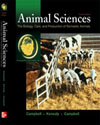
Ecology and Environmental Physiology |  |
Chapter Summary| Humans learned early on to wear clothes and modify their environment by using fire for warmth when they became chilled. But only recently have humans been able to cool themselves using mechanical refrigeration. Animals can employ many mechanisms to conserve heat and increase heat production but they possess limited means for increasing heat dissipation. Whether we can genetically select animals to fit the regions where we want and need them or develop an economical means of cooling them depends on future research. However, the future success of the animal industry is dependent on effects of the environment on producing animals. Environment includes not only the climatic complex but also nutrition, disease, management, and other related factors. The genetic makeup of the animal determines the limits of its ability to produce whereas the environment determines how much of its inherited capabilities the animal will actually achieve. From 40 to 90 percent of phenotypic variability typically results from environmental factors.
The "climatic complex" includes many factors in addition to temperature, humidity, barometric pressure, wind velocity, and solar radiation. Ecology, the scientific study of interaction between animals and their environments, must be appreciated from the standpoint of energy flow, animal temperature, diffusion theory, chemical processes, molecular biology, biological rhythms, air pollutants, social factors, pathogenic microbes, insects, and other parasites to name a few.
The complexity of biological problems associated with growth, reproduction, productivity (meat, milk, eggs, wool), longevity, genetic mutations, genetic differences among individuals and species, physical activity, adaptation, and many others must come to be understood with all the sophistication of modern science if humankind is going to continue to "be fruitful, and multiply, and replenish the earth, and subdue it; and have dominion over the fish of the sea, and over the fowl of the air, . . . and over the cattle, and over all the earth, . . . and over every living thing that moveth upon the earth," as instructed by its Creator (Genesis 1:26, 28).
|
|
|